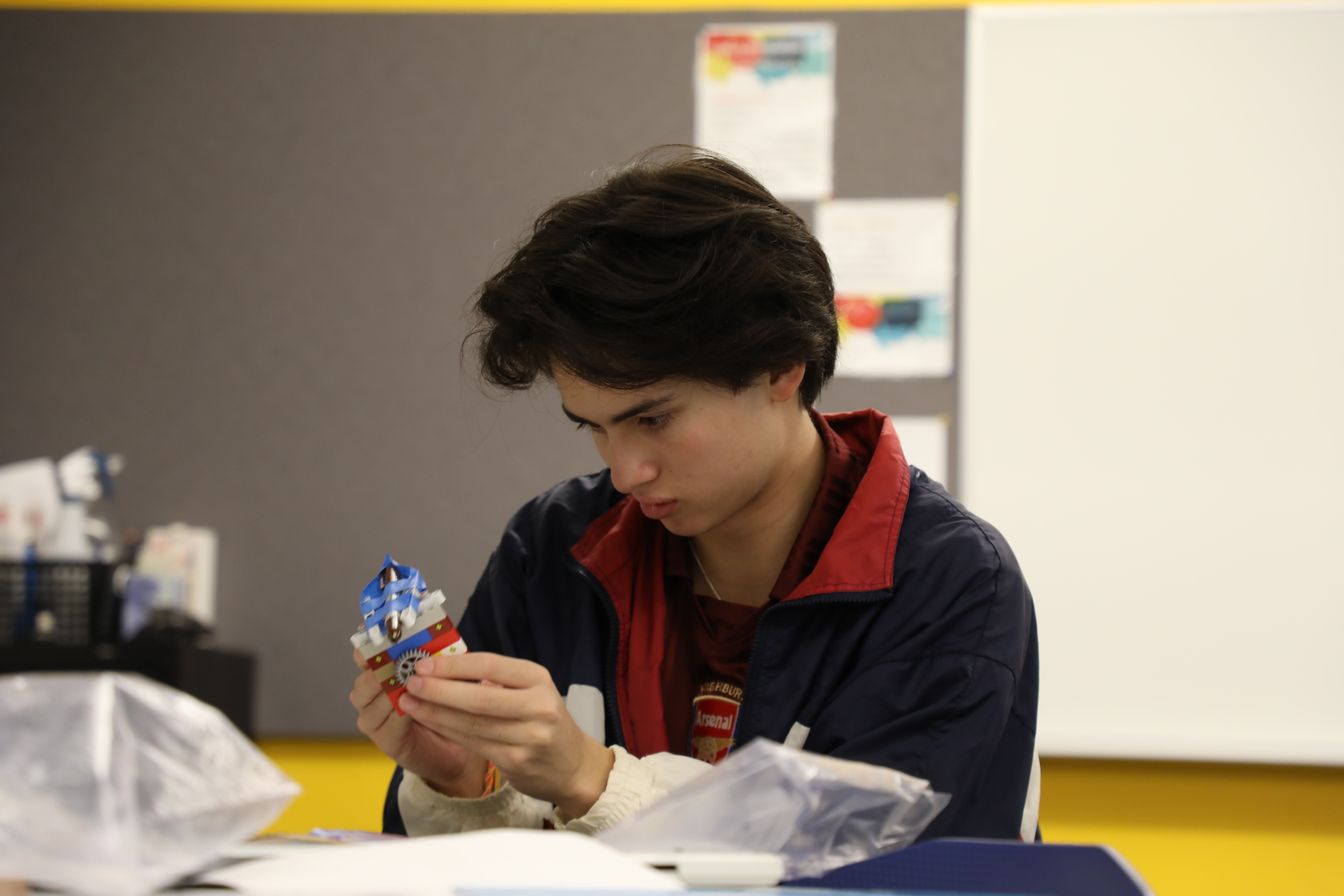Picture this: it’s midnight, you have two major assessments due tomorrow and you are on the brink of falling asleep, but you know you can’t. While some may see this as a breaking point, for many Lick-Wilmerding High School students, this is an average Tuesday night.
According to the LWHS school profile, our school is the most selective independent high school in the Bay Area, receiving between 900 and 1000 applications annually with less than 20% offered admission. As such, those who are accepted tend to graduate at the top of their middle school classes. By creating an environment where students are surrounded by supposedly, “the best of the best,” what kinds of pressures are placed on LWHS students to perform at the same rate as their peers?
I conducted interviews with students from across almost all four grade levels and asked a simple question: What values drive you in your work as a student? Their answers included academic achievement, watching others do well, success, making their family proud and not wanting to turn in “half-done work.” In theory, these are all great motivators, but they become problematic and detrimental to a student’s well-being when academic achievement overwhelms their LWHS experiences and other aspects of their humanity get lost.
Many of the values that students listed tie back to productivity culture – the idea that all of our time needs to be spent in the most efficient way, at all times. Within this culture, anything that is seen as distracting from one’s long-term career goals, like taking breaks, pursuing hobbies or seeing friends, is sacrificed.
Historically, our idea of productivity is intrinsically connected to capitalistic structures and evolves from the concept of the assembly line worker. When our workforce was largely concentrated in factories, individuals were judged based on the maximum number of product that they could make in a period of time; the more the better. Once workers moved outside of the factory and into offices, the “product” converted to ideas, pressuring people to over-exert themselves and their minds in order to meet the day’s quota.
Today, many students have fallen into the same pattern as they are judged by quantifiable measures like hours of homework per night or the number of extracurricular activities. Just like workers, to be seen as the “best student,” many people lose touch of how much they can truly manage. Caught in a work-filled frenzy, they add more than is necessary to receive the highest honor of being a “model LWHS student.”

photo courtesy of Vidigami
In several ways, LWHS has systems in place that uphold this competitive culture, even though they may not be conscious of it: students can take up to seven classes, exceeding our peer schools, and are constantly encouraged to add more leadership roles on campus to become a “jack of all trades.”
“There can be really high expectations [at LWHS], as much as people say that there aren’t. And there’s an expectation that everyone is always stressed out and that you need to do great. If you’re not doing great by doing the bare minimum then you need to overachieve,” Soluna Ibarra-Tacdol ’26 said.
Dean of Teaching and Learning and History teacher, Kate Wiley, has recognized these pressures placed on students by the school and believes that LWHS’s perception of students’ capacity in their academic and extracurricular lives has become unrealistic. “In a lot of ways, we’re sending oppositional messages to kids. One is ‘be healthy, make conscientious choices of how you want to spend your time, build in time for sleep, for play, for joy, for relationships and family.’ But also, ‘you should take seven or eight classes and you should be getting this type of grade in all of these classes, all of the time,’” she said.
LWHS community members should question whether students can really become “lifelong learners who contribute to the world with confidence and compassion” (as expressed in our mission statement) if they are being told to spend all their time on homework and maxing out their activities lists.
Similar to many others, I have fallen victim to the competitive work culture that can permeate some students’ experiences at LWHS. I spent my sophomore year with the most intense workload that I could: multiple extracurriculars that all required lunch meetings, weekly volunteering and a rigorous seven-course schedule (with an additional, unofficial independent study that limited my free blocks to zero). Over time, I began to judge myself by how little sleep I got each night or the number of times that I had burnt out in a month, the little the better because it meant I was working harder. By the end of that year, I was completely burnt out and barely sleeping all to force myself into the LWHS student model. Each of the hobbies that I used to love – making art, watching movies and reading – had been sacrificed for the grind.
However, I was not the only one who felt that pressure in sophomore year. Sophie Lee ’24, a fellow senior, also perceived the unique burnout that our grade experienced in our sophomore year. “We all reinforced each other [in productivity culture],” she said.
As students who were already extremely successful in middle school, once we reached high school, we were all clinging to the academic excellence that we had grown accustomed to. The pandemic exacerbated our sense of competition because sophomore year was the first time that we saw in person how impressive our peers were. The goal to compete became disastrous when it created a bubble and absorbed our time in pursuit of being “the best.”
“[At LWHS], everyone drags each other forward because you don’t want to be the person dragging the group behind. Those who choose not [to keep up] too will get left behind,” Mason Salma ’24 said.
A large part of the pressure that students feel to stay at the same academic level as their peers is rooted in their college aspirations. Although they often arrive at LWHS already thinking about it, once they become a student, the message only increases. The school deliberately puts measures in place that are meant to prepare students for the college admissions process but actually just cause stress.
Deans host meetings about college for parents starting in their child’s frosh year; students are advised to become involved in the community so they can add to their eventual activities lists; teachers consistently emphasize how a LWHS education will prepare them for university. As a result, college, which many view as the next step following high school, becomes almost impossible to ignore.
Even though the adults only mean well, these pressures have significant impacts on the lives of students, often for the worse. “I’ve learned at Lick that sometimes you can’t go out and do everything, as much as you may want to or see others do. It’s just not possible,” Salma said.
In the wider community, the impending pressure of college admissions can permeate students’ conversations with friends and peers, often resulting in a never-ending list of questions so that comparisons can be drawn. “How many clubs are you a part of? How many meetings do you have this week?,” Ibarra-Tacdol recalled. “It’s always what’s next? What’s next? What’s next? Whereas, living in the moment [isn’t considered].”
For some, including Lorenzo Lopez ’26, these stressors create a situation where school cannot be separated from life, causing a constant spiral over one’s performance in school. “[At LWHS], even when I’m not in school, school somehow finds its way into my life when I’m not supposed to be thinking about it. It’s a very stressful way of thinking,” he said.
Whereas, for others, they have seen how competitive work culture forces students to take “harder” classes just for the recognition they may receive (from both colleges and classmates) for having a courseload regarded as more challenging. Eliana Fassil ’24 perceives a culture at LWHS where it feels like you need to “show off that you’re doing the most just so you can get validation. But the validation doesn’t even last that long because you’re the one still in the mud of doing it.”
In this situation, students can lose sight of what they are actually passionate about because they become so caught up in what will give them the best status booster. Will taking Calculus Honors and Physics Honors make them seem smarter than if they were to double in two English 4H classes or just drop math altogether? This line of questioning plagues LWHS students, restricting their personal freedoms and making them cardboard cutouts of each other.
Ultimately, until college pressures no longer exist – which is highly unlikely given how much students cling to matriculation rates and rumors that the school “feeds” into specific universities – individuals cannot make the change for themselves because they are so blinded to its harms. Instead, it is up to the institution to restrict how much can be added to students’ plates.
LWHS began as a tech arts school, yet now we only require one year of Design and Technology and two shop electives which can easily be sped through, as I did. Have we strayed too far from our original mission today? What can be done by administrators and teachers to recraft the LWHS culture?

photo courtesy of Vidigami
According to Wiley, LWHS already has plans to curb the oppositional messaging that students receive throughout their time at this school.
Currently, the three plans include auditing the graduation requirement (which supersedes the California State University and University of California requirements), examining our daily schedule to see how there can be more built in time for students to pursue their extracurricular passions and asking whether our grading system invariably contributes to a culture of competition and unhealthy behaviors.
Hopefully all of these switches will positively impact students’ work life balances and make their experiences at this school feel more varied. Nonetheless, as a college preparatory school that only mimics the broader culture’s values of quantifiable academic excellence, LWHS remains caught in constant conundrum. Students and administration should ask themselves what else can be done to change that culture, at least, at our school?
Possibly the school should cap the number of activities students can participate in, forcing individuals to question whether they meaningfully care about each of their extracurriculars. Or create new pathways to engage with Ethnic Studies, an academic discipline that is often devalued as unimportant and further our institution’s values of being a “private school with a public purpose.”
In the future, I hope that LWHS students are able to separate themselves from their work and find the power to push against the external stressors surrounding them. In this imagined world, individuals’ long lasting friendships, developed craft and art skills, love of learning and genuine care for their communities would be what they are judged upon rather than their transcripts and Common Application activities lists.
But, right now, I am fearful of what students will be like after graduation when they no longer have their work to define them or college dreams to aspire towards.
Students must learn that their ambition has to be rooted in the present and detached from the long term goals that they set for themselves. It’s only this way that students can become fully realized people outside of their identities as LWHS learners, churning out great grades and test scores in search of some reward that never comes.







